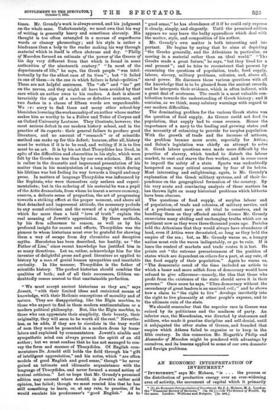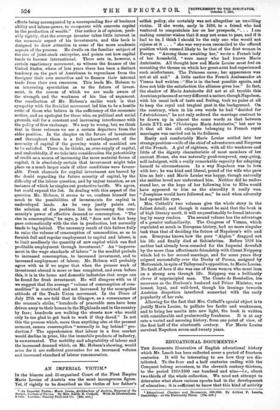AN ECONOMIC INTERPRETATION OF INVESTMENT.* "INVESTMENT," says Mr. Hobson, "is
. . . the process of the distribution of productive energy over an ever-widening area of activity, the movement of capital which it primarily
• a) An Economic Interpretation of Investment. By J. A. Hobson, 74. A. London: the `"Financial Review of Reviews." [Se. 6d.]—(2) The Science of Wealth. By the same. London Williams and Norgate. [s. net.]
effects being accompanied by a corresponding flow of business ability and labour-power, to co-operate with concrete capital in the production of wealth." Our author is of opinion, prob- ably rightly, that the average investor takes little interest in the economic aspect of his investments, and this book is designed to draw attention to some of the more academic aspects of the process. He dwells on the familiar subject of the rise of joint-stock enterprise, and points out how capital tends to become international. There sets in, however, a certain reactionary movement, as witness the finance of the United States, where of late years there has been a distinct tendency on the part of Americans to repurchase from the foreigner their own securities and to finance their internal trade from their own resources. This leads Mr. Hobson to an interesting speculation as to the future of invest- ment, in the course of which we are made aware of the strength and the weakness of his line of argument. Our recollection of Mr. Hobson's earlier work is that sympathy with the Socialist movement led him to be a hostile critic of those who believe in the sufficiency of the economic motive, and an apologist for those who, on political and social grounds, call for a constant and increasing interference with the policy of free exchange. We may be wrong, but we think that in these volumes we see a certain departure from the older position. In the chapter on the future of investment and throughout there is a full acknowledgment of the necessity of capital if the growing' wants of mankind are to be satisfied. There is, he thinks, an over-supply of capital, and undoubtedly, if we take into consideration the potentiality of credit as a means of increasing the more material forms of capital, it is absolutely certain that investment might take place on a much larger scale if other conditions were favour- able. Fresh channels for capital investment are barred by the doubt regarding the future security of capital, by the difficulty of the labour question, and by unjust taxation, as an instance of which he singles out protective tariffs. We agree, but could expand the list. In dealing with this aspect of the question Mr. Hobson, it seems to us, confines himself too much to the possibilities of investments for capital in undeveloped lands. As he very justly points out, the solution of the problem lies in increasing the com- munity's power of effective demand or consumption. " The rise in consumption," he says, p. 142, " does not in fact keep pace automatically with the rise in production, but normally tends to lag behind. The necessary result of this failure fully to raise the volume of consumption of commodities, so as to furnish full and regular employment to capital and labour, is to limit needlessly the quantity of new capital which can find profitable employment through investment." An " improve- ment in the wage standards of labour" is the needful prelude to increased consumption, to increased investment, and to increased employment of labour. Mr. Hobson will probably agree with us if we argue that when the pioneer work of investment abroad is more or less completed, and even before this, it is in the home and domestic industries that scope can be found for fresh investment. He will disagree with us if we suggest that the average " volume of consumption of com- modities" is restricted and not increased by the monopolist attitude of the Trade Union movement. In the Times of July 27th we are told that in Glasgow, as a consequence of the seamen's strike, "hundreds of peaceable men have been driven away to their homes in the Highlands and in the country by fear ; hundreds are walking the streets now who would only be too glad to get back to work if they dared." Is not this the process which, more than anything else at the present moment, causes consumption "normally to lag behind" pro- duction ? The apprehension that labour in a free market would decline in price, like the immobile products of industry, is unwarranted. The mobility and adaptability of labour and the increased demand which, on Mr. Hobson's showing, would arise for it are sufficient guarantee for an increased volume and increased standard of labour remuneration.































































 Previous page
Previous page